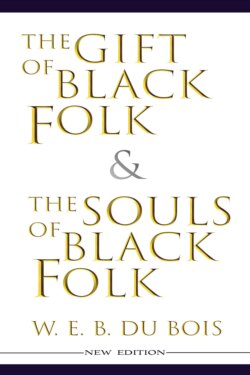Читать книгу The Gift of Black Folk & The Souls of Black Folk (New Edition) - W. E. B. Du Bois - Страница 14
На сайте Литреса книга снята с продажи.
5. The War in Cuba
ОглавлениеIn the Spanish-American War, four Negro regiments were among the first to be ordered to the front. They were the regular army regiments, 24th and 25th Infantry, and the 9th and 10th Cavalry. President McKinley recommended that new regiments of regular army troops be formed among Negroes but Congress took no action. Colored troops with colored officers were formed as follows: The 3rd North Carolina, the 8th Illinois, the 9th Battalion, Ohio and the 23rd Kansas. Regiments known as the Immunes, being immune to Yellow fever, were formed with colored lieutenants and white captains and field officers, and called the 7th, 8th, 9th and 10th United States Volunteers. In addition to those, there were the 6th Virginia with colored lieutenants and the 3rd Alabama with white officers. Indiana had two companies attached to the 8th Immunes. None of the Negro volunteer companies reached the front in time to take part in battle. The 8th Illinois formed a part of the Army of Occupation and was noted for its policing and cleaning up of Santiago. Colonel John R. Marshall, commanding the 8th Illinois, and Major Charles Young, a regular army commander, both colored, were in charge of the battalion.
The colored regular army regiments took a brilliant part in the war. The first regiment ordered to the front was the 24th Infantry. Negro soldiers were in the battles around Santiago. The 10th Cavalry made an effective attack at Las Quasimas and at El Caney on July 1 they saved Roosevelt’s Rough Riders from annihilation. The 24th Infantry volunteered in the Yellow fever epidemic and cleaned the camp in one day. Review of Reviews says: “One of the most gratifying incidents of the Spanish War has been the enthusiasm that the colored regiments of the regular army have aroused throughout the whole country. Their fighting at Santiago was magnificent. The Negro soldiers showed excellent discipline, the highest qualities of personal bravery, very superior physical endurance, unfailing good temper, and the most generous disposition toward all comrades-in-arms, whether white or black. Roosevelt’s Rough Riders have come back singing the praises of the colored troops. There is not a dissenting voice in the chorus of praise.... Men who can fight for their country as did these colored troops ought to have their full share of gratitude and honor.”
